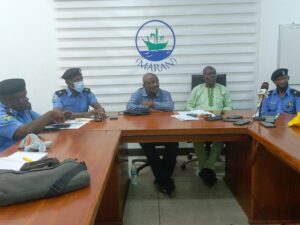
Joyce Mmereole Okoli
SP Abubakar Smart, Acting Assistant Director of the Nigeria Police Force National Cybercrime Centre, has advised journalists to exercise discipline and caution in their online reporting, emphasizing the importance of responsible communication in the digital space.
Speaking at a cybercrime workshop organized by the Maritime Reporters Association of Nigeria (MARAN) on Thursday, Smart highlighted the growing threat of cybercrime and the critical role journalists play in shaping online narratives.
“The pen can be sharper than the knife,” Smart noted, urging journalists to be mindful of their words and the potential legal repercussions of their actions. He encouraged media professionals to familiarize themselves with the Cybercrime Act of 2015 to avoid falling victim to cybercrime laws.
“What strikes the mind of people when we talk of cybercrime is internet fraud but it is more then that.
“Today, it has become a global threat due to the way we use the digital technology, the nature of our work and the way we interact online.
“Journalists need to be well-informed about the Cybercrime Act of 2015, as amended, to be more educated about cybercrime so as not to fall victim,” he said.
While many associate cybercrime with internet fraud, Smart explained that it encompasses a broader range of activities, including online bullying, stalking, identity theft, and phishing. He warned that penalties for cybercrime offenses can include prison sentences of up to 10 years, hefty fines, and asset forfeiture.
Smart also emphasized the role of regulatory agencies such as the National Cybercrime Commission, Central Bank of Nigeria (CBN), and Economic and Financial Crimes Commission (EFCC) in maintaining the integrity of Nigeria’s cyberspace.
“The punishment for cybercrime can be up to 10 years imprisonment, a fine of up to millions of Naira, asset forfeiture.
“We should be aware of regulatory agencies responsible for ensuring the cyber space is free.
“Some are National Cybercrime Commission, Central Bank of Nigeria, Economic and Financial Crimes Commission,” he said.
Dr. Layinka Adagun, a mass communication lecturer at Lagos State Polytechnic, echoed Smart’s sentiments, cautioning journalists against the pressure to chase exclusive stories at the expense of their safety. Adagun urged reporters to safeguard their online presence and activities while maintaining ethical standards.
“The internet is a powerful tool for freedom of expression, but it has also become a space where users are increasingly at risk,” Adagun said.
Adagun calls for increased awareness and the adoption of cybersecurity measures, including the use of strong passwords, regular software updates, and caution when handling links and attachments.

